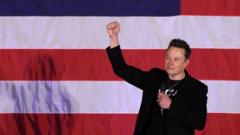This website uses cookies so that we can provide you with the best user experience possible. Cookie information is stored in your browser and performs functions such as recognising you when you return to our website and helping our team to understand which sections of the website you find most interesting and useful.

A letter sent to Elon Musk's political action committee from the US Department of Justice (DOJ) warned that his lottery-style giveaway of $1m per day to a registered voter may be illegal, according to US media.
Mr Musk, who is the world's richest man, actively campaigns for Republican Donald Trump in his presidential bid against Kamala Harris.
Over the weekend, the owner of Tesla and X/Twitter began giving away prizes to American voters who signed a petition.
It's unclear when the DOJ letter was sent to Mr Musk's organisation, America PAC. DOJ investigators have declined to comment on the case.
US outlets, including CBS News, the BBC's US partner, reported on Wednesday that the letter informed Musk's team that the giveaway may violate federal election laws.
It was sent by the DOJ's Public Integrity Section following outrage from Democrats over the cash stunt.
Under US law, it is illegal to pay people to register to vote. But it remains unclear whether the sweepstakes breaks any laws.
Mr Musk's contest offers money to signatories of a petition, which the PAC circulated.
“We want to try to get over a million, maybe 2 million voters in the battleground states to sign the petition in support of the First and Second Amendment,” Mr Musk said in Pennsylvania on Saturday when he announced the event.
The contest rules state that winners must be registered to vote, but no party affiliation is required.
“We are going to be awarding $1 million (£770,000) randomly to people who have signed the petition, every day, from now until the election,” he said.
The America PAC website states the goal is getting “1 million registered voters in swing states to sign in support of the Constitution, especially freedom of speech and the right to bear arms”.
It is open to voters in seven swing states - Pennsylvania, Georgia, Nevada, Arizona, Michigan, Wisconsin and North Carolina. US election day is 5 November.
On Tuesday, a group of Republican ex-prosecutors wrote to the DOJ urging officials to investigate the contest.
"We are aware of nothing like this in modern political history," they wrote, pointing to potential federal and state law violations.
"Law enforcement agencies are appropriately reluctant to take action shortly before elections that could affect how people vote. But serious questions arising under laws that directly regulate the voting process must be an exception."
Mr Musk previously dismissed claims that the contest is illegal, saying: "You can be from any or no political party, and you don’t even have to vote."
On Sunday, the contest reframed its rules, describing the money as payment for a job, according to CNN.
America PAC said the winner will be “selected to earn $1M as a spokesperson for America PAC”. Winners have gone on to film pro-Trump videos.
Several legal experts have told the BBC that they believe the contest may be illegal.
"His offer is only open to registered voters, so I think his offer runs afoul of this provision," said Paul Schiff Berman, a law professor at the George Washington University.
He pointed to the US Code on electoral law, which states that anyone who "pays or offers to pay or accepts payment either for registration to vote or for voting" faces a potential $10,000 fine or a five-year prison sentence.
Adav Noti of the non-partisan Campaign Legal Center said Mr Musk's scheme "violates federal law and is subject to civil or criminal enforcement by the Department of Justice".
"It is illegal to give out money on the condition that recipients register as voters," Mr Noti told the BBC.
But Jeremy Paul, who teaches law at Northeastern University, said that Mr Musk may have found a legal loophole.
He said that, while there is an argument that the offer could be illegal, it is “targeted and designed to get around what’s supposed to be the law" and he believes the case would be difficult to make in court.
Do you live outside the US and have a question out the election? Tell us here or use the form below.





 Africana55 Radio
Africana55 Radio 

